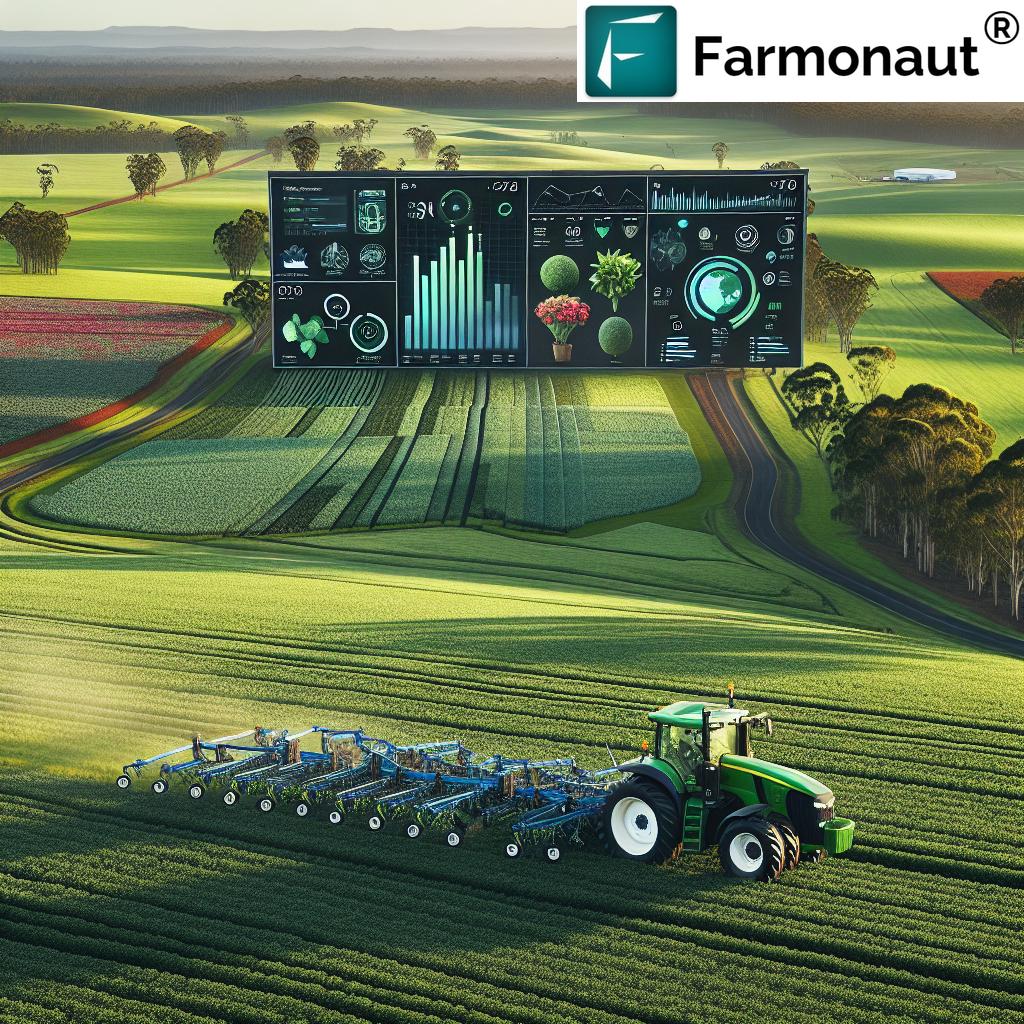Unlocking Agricultural Potential: Smart Farming Solutions and Precision Agriculture Training in New South Wales
“Over 70% of agricultural students in NSW participate in intercollegiate competitions to enhance their practical skills.”
Welcome to our comprehensive exploration of the exciting world of agricultural education and innovation in New South Wales (NSW). As we embark on this journey, we’ll delve into the experiences of aspiring agricultural professionals, the cutting-edge technologies shaping the future of farming, and the pivotal role of precision agriculture in modern farm management.
The Evolution of Agricultural Education in NSW
In recent years, we’ve witnessed a remarkable transformation in agricultural education across NSW. Traditional farming practices are now seamlessly blending with innovative technologies, creating a dynamic learning environment for students pursuing degrees such as the Bachelor of Agricultural Production and Management.
At leading universities in NSW, courses are designed to equip students with a diverse skill set, combining hands-on experience with theoretical knowledge. This holistic approach ensures that graduates are well-prepared to tackle the challenges of modern agriculture.

The Journey of an Agricultural Student in NSW
Let’s follow the journey of a typical agricultural student in NSW to understand the diverse experiences and learning opportunities available:
- Practical Experience: Many students come from farming backgrounds, bringing valuable firsthand experience from family properties, such as cattle farms.
- Intercollegiate Competitions: Participation in these events hones skills in areas like livestock judging, crop assessment, and farm management planning.
- Agricultural Shows: Involvement in local and national shows, like the Brisbane Exhibition (Ekka), provides networking opportunities and exposure to industry trends.
- Advanced Technology Training: Students gain proficiency in using agricultural management software and crop monitoring systems.
Integrating Smart Farming Solutions in Education
The integration of smart farming solutions into agricultural education is revolutionizing how students learn and prepare for their future careers. Let’s explore some key aspects:
Precision Agriculture Training
Precision agriculture is at the forefront of modern farming practices. In NSW, students are introduced to various technologies that enable precise management of crops and resources:
- Satellite imagery for crop health monitoring
- GPS-guided machinery for efficient planting and harvesting
- Soil sensors for optimized irrigation and fertilization
These technologies not only enhance productivity but also promote sustainable farming practices, a crucial aspect of modern agriculture.
Agricultural Management Software
Proficiency in agricultural management software is now a core component of agricultural education in NSW. Students learn to use various platforms for:
- Farm data analytics
- Crop yield prediction
- Resource allocation optimization
This knowledge is essential for making data-driven decisions in modern agribusiness management.
The Role of Farmonaut in Agricultural Innovation
In the realm of digital agriculture innovations, Farmonaut stands out as a pioneering force. Their satellite-based farm management solutions align perfectly with the educational goals of agricultural programs in NSW.
Key Features of Farmonaut’s Platform:
- Real-time crop health monitoring
- AI-based advisory systems
- Blockchain-based traceability
- Resource management tools
These features provide students with practical exposure to cutting-edge agricultural technology, preparing them for the future of farming.
Explore Farmonaut’s Solutions:
Challenges and Opportunities in Agricultural Education
While the integration of advanced technologies presents exciting opportunities, it also comes with challenges:
- Rapid Technological Advancements: Keeping curricula up-to-date with the latest innovations
- Balancing Traditional and Modern Practices: Ensuring students understand the value of both
- Access to Technology: Providing students with hands-on experience with expensive equipment
However, these challenges also present opportunities for innovation in teaching methods and partnerships with agritech companies like Farmonaut.
The Future of Agricultural Careers in NSW
The future looks bright for agricultural graduates in NSW. With their diverse skill set combining traditional knowledge and technological proficiency, they are well-positioned to tackle the challenges of modern farming.
Emerging Career Paths:
- Precision Agriculture Specialist
- Agritech Consultant
- Sustainable Farming Advisor
- Agricultural Data Analyst
These roles highlight the increasing importance of technology and data in agriculture.

Sustainable Agriculture Practices in Education
Sustainability is a key focus in agricultural education in NSW. Students learn about:
- Water conservation techniques
- Soil health management
- Integrated pest management
- Carbon footprint reduction strategies
These practices are essential for ensuring long-term agricultural productivity and environmental stewardship.
“Agricultural management software can increase farm productivity by up to 25% through data-driven decision making.”
The Impact of Farm Data Analytics
Farm data analytics is revolutionizing agricultural decision-making. In NSW, students are taught to:
- Interpret satellite imagery for crop health assessment
- Analyze weather patterns for optimal planting and harvesting times
- Use predictive modeling for yield forecasting
These skills are crucial for maximizing productivity and minimizing resource waste in modern farming.
Practical Applications of Precision Agriculture
Students in NSW are exposed to various practical applications of precision agriculture, including:
- Variable Rate Technology: For precise application of inputs like fertilizers and pesticides
- Automated Irrigation Systems: For water conservation and optimal crop hydration
- Drone Technology: For aerial mapping and crop monitoring
These technologies are transforming farming practices, making them more efficient and environmentally friendly.
The Role of Artificial Intelligence in Agriculture
Artificial Intelligence (AI) is playing an increasingly important role in agriculture. In NSW, students learn about AI applications such as:
- Crop disease detection using image recognition
- Predictive maintenance for farm machinery
- Automated sorting and grading of produce
Understanding these AI applications prepares students for the future of smart farming.
Integrating Traditional and Modern Farming Practices
While embracing new technologies, agricultural education in NSW also emphasizes the importance of traditional farming knowledge. Students learn to:
- Combine time-tested farming practices with modern innovations
- Understand the ecological impact of different farming methods
- Appreciate the cultural significance of traditional agricultural practices
This balanced approach ensures that graduates can adapt to various farming contexts and challenges.
The Importance of Agribusiness Management
Agribusiness management is a crucial component of agricultural education in NSW. Students develop skills in:
- Financial planning and budgeting for farms
- Supply chain management in the agricultural sector
- Marketing agricultural products
- Understanding agricultural policy and regulations
These business skills are essential for running successful and sustainable agricultural enterprises.
Agricultural Shows and Competitions: Beyond the Classroom
Participation in agricultural shows and competitions is an integral part of agricultural education in NSW. These events provide students with opportunities to:
- Showcase their skills in livestock handling and crop assessment
- Network with industry professionals
- Stay updated on the latest agricultural innovations
- Develop leadership and teamwork skills
Events like the Brisbane Exhibition (Ekka) and intercollegiate competitions in Rockhampton offer invaluable real-world experience.
The Global Perspective in Agricultural Education
Agricultural education in NSW also emphasizes a global perspective. Students are encouraged to:
- Understand international agricultural markets and trade
- Study sustainable farming practices from around the world
- Explore opportunities for international agricultural development
This global outlook prepares graduates for careers in an increasingly interconnected agricultural world.
The Role of Research in Agricultural Education
Research plays a vital role in agricultural education in NSW. Students are encouraged to:
- Participate in ongoing research projects
- Conduct their own experiments and field trials
- Stay updated on the latest agricultural research findings
This research-oriented approach fosters innovation and critical thinking skills essential for the future of agriculture.
Addressing Agricultural Challenges through Education
Agricultural education in NSW is designed to address current and future challenges in the sector, including:
- Climate change adaptation strategies
- Sustainable water management in drought-prone areas
- Biosecurity and pest management
- Improving soil health and biodiversity
By focusing on these challenges, educational programs prepare students to be problem-solvers and innovators in the agricultural sector.
The Future of Agricultural Technology
As we look to the future, agricultural education in NSW is embracing emerging technologies such as:
- Internet of Things (IoT) for farm monitoring
- Blockchain for supply chain transparency
- Advanced robotics for automated farming tasks
- Gene editing for crop improvement
Exposure to these technologies ensures that graduates are at the forefront of agricultural innovation.
Comparison: Traditional vs. Modern Agricultural Education
| Aspect | Traditional Approach | Modern Approach with Smart Farming Solutions |
|---|---|---|
| Crop Monitoring | Visual inspection | Satellite imagery and AI-powered analytics |
| Farm Management | Manual record-keeping | Digital farm management software |
| Data Analysis | Basic statistical analysis | Advanced predictive modeling and machine learning |
| Sustainability Practices | General environmental awareness | Precision resource management and carbon footprint tracking |
| Pest Management | Scheduled pesticide application | IoT sensors for early detection and targeted treatment |
| Irrigation | Time-based scheduling | Soil moisture sensors and weather data-driven irrigation |
Conclusion
As we’ve explored throughout this blog, agricultural education in New South Wales is at the forefront of combining traditional farming wisdom with cutting-edge technology. The integration of smart farming solutions, precision agriculture, and data analytics is preparing the next generation of agricultural professionals to meet the challenges of sustainable food production and resource management.
The journey of agricultural students in NSW, from hands-on experiences on family farms to participation in intercollegiate competitions and engagement with advanced technologies, reflects the dynamic and evolving nature of the agricultural sector. Companies like Farmonaut are playing a crucial role in this educational landscape, providing innovative tools that bridge the gap between classroom learning and real-world application.
As we look to the future, it’s clear that the agricultural graduates of NSW will be well-equipped to lead the way in sustainable, efficient, and technologically advanced farming practices. They will be the driving force behind the continued evolution of agriculture, ensuring food security and environmental stewardship for generations to come.
FAQ Section
Q1: What are the key benefits of integrating smart farming solutions into agricultural education?
A1: Integration of smart farming solutions enhances students’ technical skills, improves decision-making abilities, promotes sustainable practices, and prepares them for the technologically advanced future of agriculture.
Q2: How does precision agriculture contribute to sustainable farming practices?
A2: Precision agriculture enables targeted resource use, reducing waste and environmental impact. It allows for optimized application of water, fertilizers, and pesticides, leading to more sustainable and efficient farming practices.
Q3: What role do agricultural shows and competitions play in a student’s education?
A3: These events provide practical experience, networking opportunities, and exposure to industry trends. They help students develop critical skills in areas like livestock handling, crop assessment, and agribusiness management.
Q4: How is artificial intelligence changing the agricultural landscape?
A4: AI is revolutionizing agriculture through automated crop monitoring, predictive analytics for yield forecasting, intelligent pest and disease detection, and optimized resource management.
Q5: What career opportunities are available for graduates of agricultural programs in NSW?
A5: Graduates can pursue diverse careers including precision agriculture specialists, agritech consultants, sustainable farming advisors, agricultural data analysts, and traditional farming roles with a modern technological edge.






